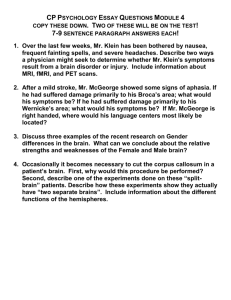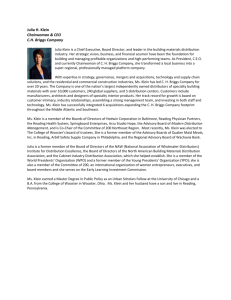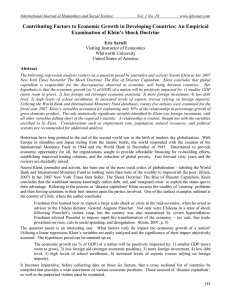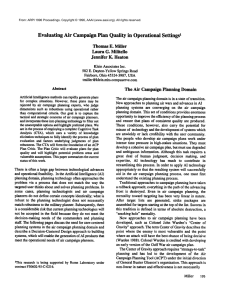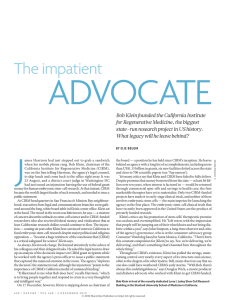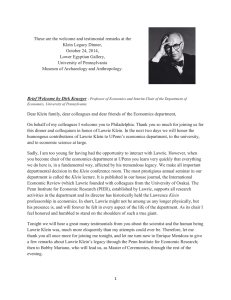Fall 2013 by Edward F. Ansello, Ph.D.
advertisement
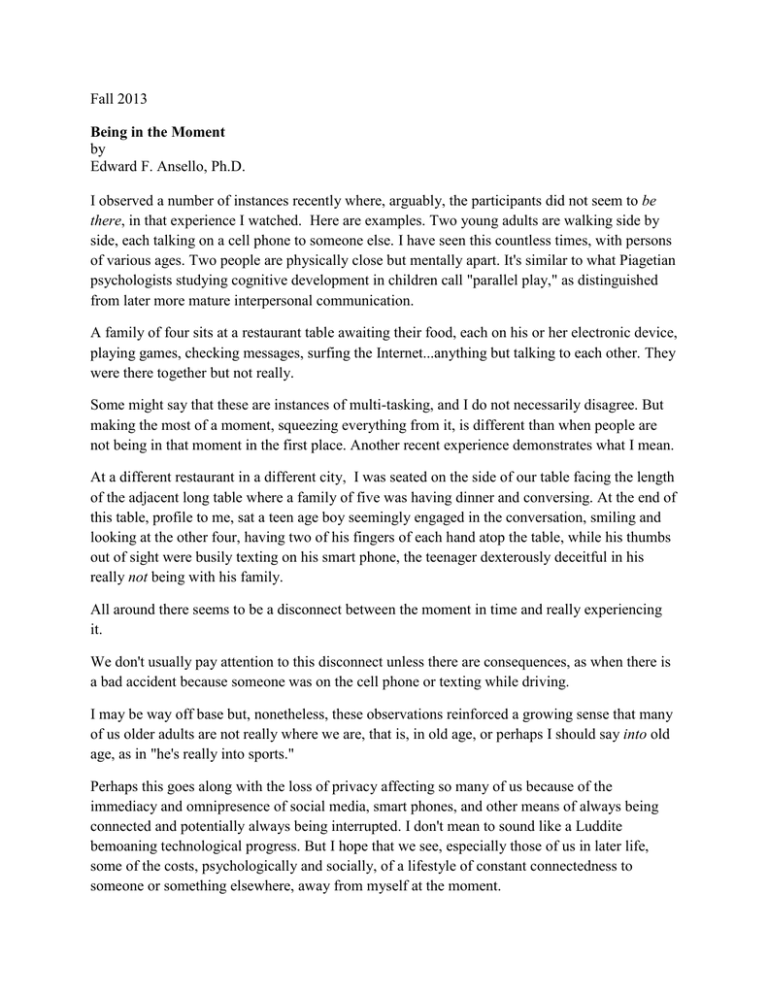
Fall 2013 Being in the Moment by Edward F. Ansello, Ph.D. I observed a number of instances recently where, arguably, the participants did not seem to be there, in that experience I watched. Here are examples. Two young adults are walking side by side, each talking on a cell phone to someone else. I have seen this countless times, with persons of various ages. Two people are physically close but mentally apart. It's similar to what Piagetian psychologists studying cognitive development in children call "parallel play," as distinguished from later more mature interpersonal communication. A family of four sits at a restaurant table awaiting their food, each on his or her electronic device, playing games, checking messages, surfing the Internet...anything but talking to each other. They were there together but not really. Some might say that these are instances of multi-tasking, and I do not necessarily disagree. But making the most of a moment, squeezing everything from it, is different than when people are not being in that moment in the first place. Another recent experience demonstrates what I mean. At a different restaurant in a different city, I was seated on the side of our table facing the length of the adjacent long table where a family of five was having dinner and conversing. At the end of this table, profile to me, sat a teen age boy seemingly engaged in the conversation, smiling and looking at the other four, having two of his fingers of each hand atop the table, while his thumbs out of sight were busily texting on his smart phone, the teenager dexterously deceitful in his really not being with his family. All around there seems to be a disconnect between the moment in time and really experiencing it. We don't usually pay attention to this disconnect unless there are consequences, as when there is a bad accident because someone was on the cell phone or texting while driving. I may be way off base but, nonetheless, these observations reinforced a growing sense that many of us older adults are not really where we are, that is, in old age, or perhaps I should say into old age, as in "he's really into sports." Perhaps this goes along with the loss of privacy affecting so many of us because of the immediacy and omnipresence of social media, smart phones, and other means of always being connected and potentially always being interrupted. I don't mean to sound like a Luddite bemoaning technological progress. But I hope that we see, especially those of us in later life, some of the costs, psychologically and socially, of a lifestyle of constant connectedness to someone or something elsewhere, away from myself at the moment. Perhaps this is the root of it. I know that many of us don't want to be just ourselves in later life. We may want to continue being who or what we were early in life or to maintain the activity or achievement levels of our mid-lives. I recall the findings of a fairly recent survey of the membership of a large aging advocacy group: the majority of 65 year old respondents selfdescribed as "middle aged." If someone wants to deny old age, who am I to say otherwise? Still I wonder, if not in later life, where is the time for reflection? The one thing an old person has in abundance is accumulated experience. Appraisal takes time but for many older adults their time switch is constantly turned to "forward" mode, like the neuronal connections in the brains of those with attention deficit disorder. Many of us are becoming addicted to an unrelenting inflow of experiences, without taking or allotting the time to appraise these experiences. Later life means that one has already lived a long time. This may seem ridiculously obvious. But denial of old age, busily trying to be somewhere else, is common. If you look, you can readily see examples of people not being truly in the moment, not being engaged in where they are. Not just in daily life, but also in the life course. I have recently read Daniel Klein's Travels with Epicurus (2012). It's a slim book fat with agingrelated insights, written by the author of 25 other books, many of which enjoyably translate to everyday language the deep thinking of various renowned philosophers. Klein has been visiting a small Greek island for years and he's now in his late 70s or early 80s. The island's rural, nonmotorized pace has apparently been ideal for the introspection and integration of life experiences that, he says, used to be common in late life. Klein introduces a small cast of characters who frequent the local taverna and through his interactions with them comes to appreciate the lost benefits of old age. He notes that reflecting on accumulated experiences may be essential to achieving wisdom, historically one of the associations most often made with old age. As in wise old man or wise old woman. Instead of seeing older adults engaged in this time-taking, he sees us incessantly trying to finish one experience before hurriedly starting another, seeing time as a void into which we must pour activities. With time growing shorter, some of us quicken the pace rather than pausing. Lacking an awareness of the depth of accumulated experiences, we try to pile on new events, trips, things. Klein maintains that pondering the big questions is one of the "principal callings of an authentic old age." Questions like: What is the purpose of late life? Why did I live the life I did? And making sense of our lives is one of the tasks and one of the privileges of later life. Not that our memories are objectively "accurate." How can they be?; we live subjectively. Memory, after all, is a mix of the "story truth versus the happening truth," as Tim O'Brien so powerfully elucidated in his work on the Viet Nam war, The Things They Carried. This mix is inevitable in trying to figure out one's own life for oneself alone. We may "sift through our memories for themes and then search for memories that validate them." We may discover memories filled with regret and despair but nonetheless come to an acceptance of ourselves. We may come out from reflection with a sense of the thread of our own life. Some sociobiologists suggest that there really isn't a script for later life after the survival of the human species has been assured through procreating, rearing, and launching the next generation. This may reinforce the expansion of differences among us as we age, what we've called the process of individuation. Clearly, then, there are huge differences in how we each face old age, and reflection and life-integration are not for everyone, perhaps not even for the majority. I would join with Klein in arguing that, in the past, there used to be a script: if one were privileged to reach late life, take time to be in that moment, rather than trying to avoid it; take advantage of having so many accumulated experiences, sift through them to try to make sense of them. This returns us to the observations of being in the moment and having the full experience of it. I think that reflection is a gift to be opened in late life.
